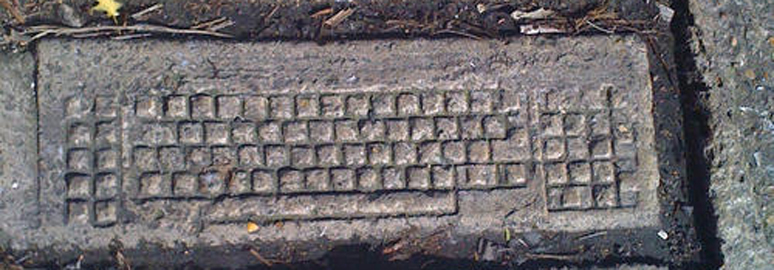As kids we are taught that archeology means digging up dinosaurs, pure and simple. If we happen to find an old cell phone buried underneath a few inches of playground dirt, that's not archeology, that's just finding an old cell phone in the playground. The cell phone just isn’t old enough, right? Wrong. I submit that in the future, technological and cultural advancement will lead us into a society that understands the fragility of "now" and that treats anything in the past as ancient. And if we continue to follow the status quo model for ancient stuff, it will end up in one of two places - a musuem, or a land fill. Hopefully they will have figured out the whole land fill thing but that's a conversation for another day. An object's almost instant induction into the realm of museum relic is “exhibit A” of this conversation.
If I had to guess, I'd say that our current society tends to think that anything older than 50 years is considered an antique. What would a world be like where things become antiques after 5 years? 1 month? 2 days? Would it feel like a struggle to keep up with the "times" or would keeping up be ingrained in our future-prepped brains? I want to know this brain. This kind of accelerated "now" is already happening, whether we like it or not. Think about the first portable media player you owned. Mine was a purple Rio in 1999 that held 4-6 songs. For 2 years that thing was a cornerstone of my entertainment repertoire. Now, it is ancient, relegated to a sort of technology archeology that I will now refer to as Techneology. The future is already looking back on these objects of techneology, attempting to piece together the fiction they will have become. “Why would people have wanted such a cumbersome grey box that plays weird spools of tape?”, they’ll ask of the now 30 year old Walkman.
We tend to think of the past in different kinds of buckets - sometimes decades, sometimes by who was president, other times, by what school grade we were in. History to me is defined by the technologies available to and invented by that era, the generation into which you are peering. We are the internet generation, just like our grandparents were the nuclear weapon generation before us. Each of us is so deeply submerged into the liquid fabric of our technological context that we can't imagine being anywhere else. Unless of course, we look to the past, rewinding technological progress to understand our origins or telescope into our unknown futures, guessing at what may come to define our children's generation. Yet we really have no idea who or what the inhabitants of our future will be, and in that sense, we have no future. As Hubertus Bigend puts it in William Gibson’s Pattern Recognition, “Fully imagined cultural futures were the luxury of another day, one in which ‘now’ was of some greater duration. For us, of course, things can change so abruptly, so violently, so profoundly, that futures like our grandparents’ have insufficient ‘now’ to stand on. We have no future because our present is too volatile.” See I believe that because of this ever constricting sense of "now", the definition of "future" becomes infinitely more difficult. Without a stable "now", it is virtually impossible to define a future, only to identify change. I believe that change (technological and otherwise) is and will continue to be the only reliable factor of the future. It is these delineations of time and technology that I am interested in about history.
If we start by thinking about time as an ongoing, ever changing layer on top of our lives, how might that change what we perceive as history? For instance, was you reading that last sentence history? I just wrote about it in the past tense, so maybe that means that when you first started reading about it, the rest of the sentence was in the future, the word you were on at any given moment in time was the present and as soon as you finished one word, or even one syllable, it was in your past. So, in case you haven’t noticed, we are all constantly defining our pasts and creating our own futures by what happens each and every moment of the present. BUT, and here comes the tricky part...In a now that is changing so fast, so often, how can we even define what "now" is? How can the definition keep up with the actuality of “nowness” that is changing on a daily basis, or even moment to moment if you think about it as we just did? It turns out that what interests me most about this is the blur; the fogginess between then and now, and what that means for history and future.
Culturally this raises all kinds of hairs on the back of the collective human society’s neck. As a culture, how can we document events as they happen, keeping up with the increasing pace of change? Even the mediums we use to define and socialize what we think of as "now" must change to keep up with now's ever changing media formats and tech fetishes. We see this already with the online and mobile news phenomenon. News printed on paper is simply too old, too slow, hours out of date by the time it is delivered. As society’s expectation of the “currentness” of now tightens, media of all kinds will shift and adapt to meet the need. Either that or it will join the vast ranks of the techneology abyss.
